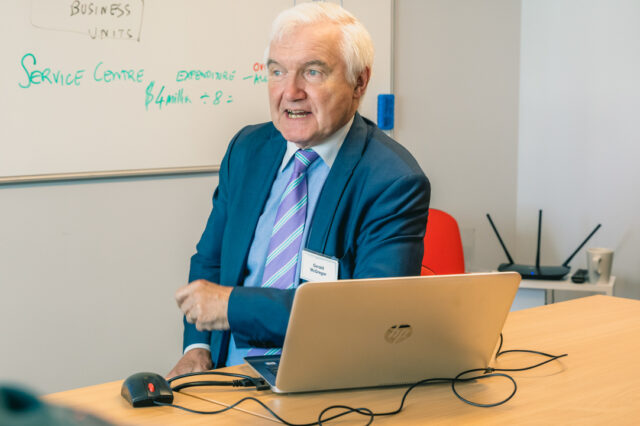Course Overview
This course is based on the three pillars of the UK Civil Service Policy Profession skills framework: Strategy, Politics and Delivery. It will provide insight and understanding to create and plan the delivery of hugely challenging Public Sector policies successfully. It analyses the many, and often conflicting strategic priorities within the public sector, and how to reach a compromise, so that a cohesive and coherent policy can be created and implemented. We discuss the fundamental requirements of a structured, strategic planning process. However, it is essential to remember that strategic planning takes places in a wider political context, which is often in a constant state of flux, and subject to a plethora of interests and influences, so such strategy creation cannot be carried out in isolation. Understanding, appreciation and consultation of stakeholders is essential to the successful outcome of a policy, so that we consider in depth how to achieve this. This course also gives deep insight into the complex and interrelated factors which help or hinder the successful implementation of Public Sector policy. Many Public Sector policies do not deliver their intended outcomes. They often go over budget; are extraordinarily late; have unintended consequences; do not achieve their desired level of service; are irrelevant; are not wanted or just fizzle out. The course provides understanding of how and why public sector strategy can work. It provides tools, techniques and templates on how to understand needs and requirements, and then manage influences and interests, to ensure successful policy outcomes. It focuses on how to create, implement, evaluate and adjust policy as it is progresses. We analyse the key factors required for successful implementation at the global, national and local levels. Risks and crises are ever-present in the political arena and we discuss how to analyse, anticipate, evaluate and react to these and other specific crises which might arise at any time and ensure they do not deflect from providing the quality services expected and required.
The Leadership Essentials programme is a focused, one-week course designed for new and emerging leaders — or experienced professionals looking to strengthen their leadership foundations. The programme explores the core attributes of effective leadership, including mindset, emotional control, executive presence, and behavioural impact. Participants will reflect on their own leadership identity, learn practical techniques for managing pressure, and develop the habits that build trust and credibility. Delivered through a mix of discussion, case examples, peer learning, and practical exercises, the course creates space for leaders to define their leadership edge and increase their day-to-day effectiveness.
Agenda
Day — 1 Setting the right direction: Strategic vision and planning
- The importance of goals and objectives: Setting meaningful objectives
- The importance of a structured approach: Understanding and using the ‘policy cycle’ to develop robust policies
- The importance of understanding your context: Evaluating complex contextual factors
Day — 2 Politics and the public sector
- Aligning and resolving conflict between political objectives, conflicting demands and incompatible priorities.
- Civil servants working directly with elected/appointed Ministers
- Engaging with Stakeholders
Day — 3 The importance of a strategic approach
- Analysis of evidence
- Monitoring and evaluating policy implementation
- Risk management and risk culture
Day — 4 Thinking about implementation from the start
- Policy tools for effecting change and criteria for using them
- Communication as a policy tool
- Working with delivery partners
Day — 5 Weekly Review
- Summary and recap of key learning objectives
- Action Planning
Day — 6 Leading with Impact: Defining Your Leadership Edge
- Key characteristics of great leadership
- Behaviours and habits that create credibility and influence
- Comparing leadership styles using real-world benchmarks
Day — 7 Leadership Traits and Psychological Mindsets
- Core traits that distinguish effective leaders in complex environments
- Mindset development and its application
- Cognitive flexibility and its role in adapting leadership behaviour across contexts
Day — 8 Self-Regulation and Leadership Composure
- Regulation strategies for maintaining leadership stability
- Identification and management of personal leadership triggers
- Techniques to sustain focus, and clarity under pressure
Day — 9 Executive Presence and Leadership Identity
- Key dimensions of executive presence: credibility, clarity, and composure
- Alignment between self-perception and external leadership signals
- Verbal and non-verbal techniques for increasing leadership impact
Day — 10 Course Review
- Summary and recap of key learning objectives
- Action Planning
Post-Course
- Six (6) x hour-long Executive Coaching sessions at monthly intervals following Course Completion
Target Audience
This course is suitable for a wide range of professionals but will be of real value to experienced or new or aspiring:
- Permanent Secretaries, Cabinet Secretaries and all Civil Servants.
- C-Suite Officers and Chairpersons of Non-profit organisations and Charities.
- Senior Public Sector Officers who work directly to lead Politicians.
- Elected and appointed Policymakers, Managers, and Planners in Governments, Public Agencies, and Non-profit organisations.
- City Council Members, Mayors, City Managers, Administrators, and Planners.
- Senior officers who work with Public Services to achieve broader community outcomes, e.g., Public Health and Well-being, Economic Development, and Community Relations.
- Police Chiefs, Fire Chiefs, and their staff.
- School Board Members, Administrators, and staff.
- Board Members and Company Secretaries.
- Non-executive Directors
- Directors, Deputy Directors, and Senior Managers.
- Heads of Departments
- Transformation Leaders
- Change Managers
- CSR and Sustainability Managers and staff.
- Risk Managers and professionals.
- Community Relations Managers and Executives.
- Health, Safety and Environmental Managers and officers.
- Legal and Compliance Managers and professionals.
- Managers and staff who wish to develop responsible strategic practices.
- Managers and staff concerned with influencing or implementing organisational strategies.
- Those who wish to capitalise on and grasp all strategic opportunities for their organisations.
- Those who wish to promote the strategic success of their organisation.
Learning Outcomes
By the end of this course, you will be able to implement a successful strategy that enables you to:
- Set meaningful policy objectives that support successful delivery
- Use a structured approach to developing effective policy
- Analyse the contextual factors that affect your policy area effectively
- Understand, anticipate, and facilitate resolution of conflicts between competing agendas
- Successfully negotiate your responsibility as an impartial civil servant
- Develop and use a stakeholder map to create a comprehensive stakeholder engagement plan
- Assess, use, and communicate the value of high-quality evidence
- Design a robust monitoring and evaluation framework
- Develop an appropriate risk register
- Identify various policy intervention options and criteria for their use
- Engage effectively in communication planning to support policy implementation
- Identify and create successful partnerships with key delivery partners
- Identify and understand key characteristics of great leadership.
- Develop behaviors and habits that build credibility and influence.
- Analyse and evaluate leadership styles using real-world benchmarks.
- Recognize core traits that enable effective leadership in complex environments.
- Cultivate and apply growth-oriented mindsets.
- Adapt leadership behaviors through cognitive flexibility.
- Implement strategies to maintain leadership stability.
- Recognize and manage personal leadership triggers.
- Use techniques to sustain focus and clarity under pressure.
- Strengthen key dimensions of executive presence: credibility, clarity, and composure.
- Ensure alignment between self-perception and external signals of leadership.
- Utilize verbal and non-verbal techniques to enhance leadership impact.
Course Dates
Spaces limited to NINE (9) delegates per course. Book Now to avoid missing out!
Similar Courses
Advanced Public Sector Policy, Strategy and Leadership (8-days)
Duration: 8 days
Public Sector Management Essentials
Duration: 5 days
Public Sector Management Excellence
Duration: 5 days
Advanced Public Sector Policy and Strategy Development (3-days)
Duration: 3 days
Public Sector Strategy Excellence Workshop
Duration: 3 days
Advanced Public Sector Policy and Strategy Development (5-days)
Duration: 5 days







